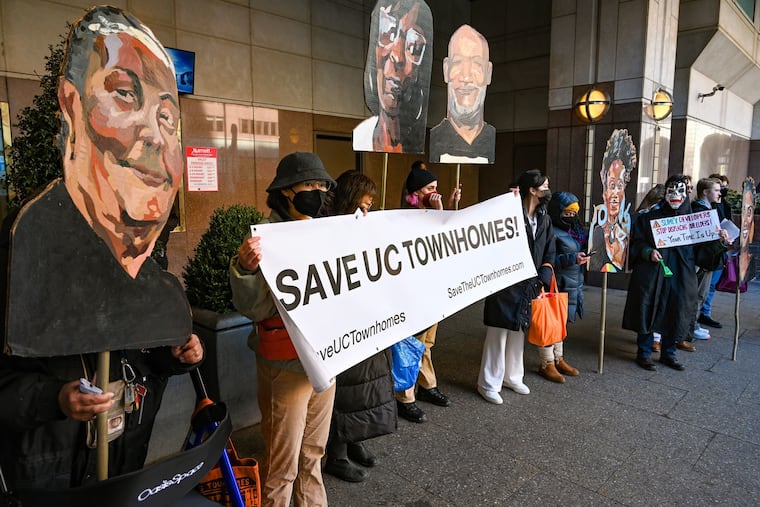UC Townhomes protesters attempt to disrupt mayoral luncheon and demand city help
The protesters demanded that the Kenney administration assist their campaign to preserve the federally subsidized complex at 40th and Market Streets.

For the first 16 years of Mel Hairston’s life, home was elusive.
The 45-year-old remembers bouncing between residences as a teenager before settling in at the University City Townhomes, a 69-unit affordable housing complex in West Philadelphia. There, Hairston found community.
Nearly three decades later, he’s fighting to keep that community alive.
He and about two dozen Save UC Townhomes protesters convened Wednesday outside the Marriott Hotel in Center City — where Mayor Jim Kenney was speaking at a luncheon — to demand the Kenney administration assist their campaign to preserve the federally subsidized complex at 40th and Market Streets.
“Many areas of the city don’t have a safe place for children,” said Hairston, who watched his daughter grow up in the complex. “With the violence going on, your child can get shot, can get snatched off the street. In the townhomes, we don’t have to worry. … It’s a safe space.”
In 2021, the building’s owner, IBID Associates, announced it would not renew its Section 8 contract with the Department of Housing and Urban Development. Soon after, Hairston and other residents were told they had to find housing elsewhere.
After multiple extensions, the contract that was set to expire Jan. 31 has now been pushed to the end of February, buying the remaining residents a few more weeks to search for a home as IBID aims to demolish the site and sell it to developers who reportedly valued it at at least $75 million.
Residents in 13 units — around a third of the Townhomes’ occupancy — have remained on site, citing a dearth of affordable units in other neighborhoods and discriminatory landlords who are wary to accept the housing vouchers they were provided.
Oversize cutouts of painted faces presided over the protest, attached to wooden sticks and hoisted proudly in the air — faces of the sick and elderly of the Townhomes, many of them Black and brown residents who were unable to attend. They stood outside as Kenney attended the Chamber of Commerce for Greater Philadelphia’s annual mayoral luncheon and discussed his priorities for his last year in office.
A smaller group of protesters entered the hotel during the mayor’s event but were escorted out by security. No arrests were made, according to the group.
Among Save UC Townhomes’ demands were that Kenney preserve a minimum portion of the complex for affordable housing, grant displaced occupants the right to return in the future, and give the group a seat at the table in plans for the property.
Protesters have also taken aim at the mayor’s administration for what they see as a failure to communicate with Townhomes residents the outcome of an ongoing federal lawsuit between the city and IBID Associates, which sued to block City Council’s moratorium on demolitions at the site.
Sarah Peterson, a spokesperson for Kenney’s office, declined to comment on the suit.
“Affordable housing is and has always been a priority to the Kenney administration,” Peterson said in an email. “Despite limited federal, state and local funding, the City’s Department of Planning and Development and the City’s full-service community development nonprofit PHDC work together to create and preserve affordable housing. The need outweighs the resources, but we are using creative strategies to maximize opportunities for residents in need.”
For Krystal Young, a 29-year-old single mother who remained at the Townhomes, that need is immediate as she searches for alternative housing amid a record surge in rental costs in Philadelphia.
Kevin Feely, a spokesperson for IBID Associates, said in an email that the building’s ownership has worked with the Philadelphia Housing Authority to issue residents tenant protection vouchers, which HUD issues to low-income families who are displaced from public housing to assist with rent payment at other properties.
“Since the announcement of its intention to opt out, IBID’s relocation experts have been available to work with all residents who sought our assistance,” Feeley said. “That work continues, as evidenced by the growing number of residents who have relocated from UCity Townhomes.”
But according to Young and housing experts who joined the protest, landlords can choose whether they accept the vouchers — and for Young, many hadn’t.
“I couldn’t get scheduled in to even see the property, because they wasn’t accepting them,” Young said. “What can we do, when a landlord doesn’t accept vouchers?”
Young, who has a 14-year-old daughter, had to put her education on hold as she searches for apartments full time. Before she was told about the lapsed contract, Young was studying at Community College of Philadelphia toward a degree in nursing to help provide for her family.
Activists with the Save UC Townhomes organization said that some low-income residents were paying around $90 per month to live on the property, a figure determined by their income level. Many had lived there for decades. Residents benefited from the highly walkable area with amenities and hospitals nearby, making them hesitant to leave and willing to march on City Hall for their cause.
“Stop putting profit over the people,” Young said. “We’re gonna fight back, we’re going to. We’re not going to stop until we get what we need.”